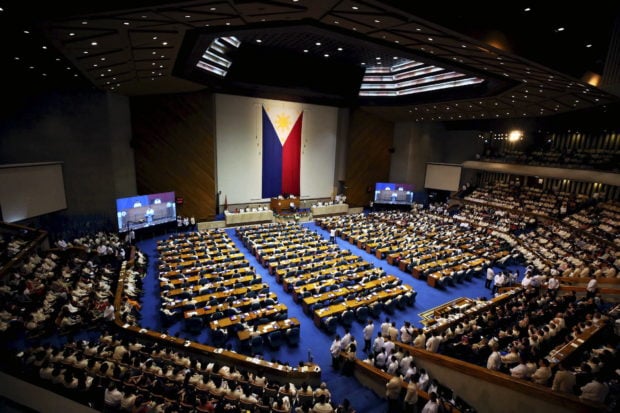House panel passes key amendments to Maharlika fund, including penal provisions

Batasang Pambansa plenary. —MALACAÑANG FILE PHOTO
MANILA, Philippines — A panel from the House of Representatives on Monday approved several amendments to the proposed Maharlika Investment Fund (MIF), including penal provisions that would prescribe jail time and fines for officials who violate investment policies.
According to House Committee on banks and financial intermediaries chairperson and Manila 5th District Rep. Irwin Tieng, they have approved the amendments mentioned during last Friday’s hearing of the Committee on appropriations, including the removal of the Government Service Insurance System (GSIS) and Social Security System (SSS) allocations worth P175 billion from the pooled funds.
Tieng said that Albay 2nd District Rep. Joey Salceda, chair of the Committee on ways and means who has been supportive of the measure, has introduced to the officials several penal provisions.
“Some of the amendments that were mentioned are the removal of SSS and GSIS (funds). The amendments was made last Friday at the Committee on appropriations so we just approved it in the committee […] Aside from that, earlier, several penal provisions were added by Congressman Joey Salceda,” Tieng said.
“In our penal provisions it was stated that […] any ‘director, trustee or officer who willfully and maliciously violates investment policies and guidelines set by the Board of Directors as defined pursuant to Section 19 of this act, or whose acts of gross negligence willfully misconduct, fraud, or actions in breach of any investment agreement, in a loss suffered by the fund, shall be liable jointly and severally for all damages resulting therefrom suffered by the corporation,’” he noted.
According to Tieng, Salceda’s insertions stated that stockholders or members of the proposed Maharlika Investment Corporation, which under House Bill No. 6398 would manage the MIF, can suffer imprisonment of not less than one year but not more than five years and/ or a fine of not less than P50,000 but not more than P2 million if proven guilty of violating guidelines.
Another provision stated that the MIC could not be a manager of a company it invests in — making it a passive investor.
“Actually there is another provision here, Section 13, allowable investment. I just want to explain that they placed here that in the event that the Maharlika buys a company or invests in one, it cannot manage that company,” Tieng said.
“So it is like being a passive investor. We removed the provision allowing it to manage a company if it ever enters into a company. Also, we approved additional co-authors,” he added.
Aside from these, other provisions mentioned last Friday, like the removal of the president as the chairman of the MIC board and the increase in independent directors from two to four, have been approved.
House Bill No. 6398 has been criticized heavily by opposition lawmakers and netizens due to several concerns, primarily due to fears that workers in the government and the private sector may lose their pension if GSIS and SSS place funds in the MIC, and if the latter investments do not reap high returns.
This led the authors to announce that the P175 billion from GSIS and SSS would no longer be included. However, critics still maintained that House Bill No. 6398 should no longer be pushed through due to the current fiscal status of the country, where the budget is usually in a deficit and the lack of surplus funds.
Earlier, Alliance of Concerned Teachers party-list Rep. France Castro warned that proponents of the proposed sovereign wealth fund (SWF) only removed the GSIS and SSS funds to allow public anger to wane first — claiming that these would be added later on.
RELATED STORIES
Marcos backs Maharlika fund: ‘We need added investment’
Poor need ample aid, not corrupt-prone Maharlika wealth fund, gov’t told
Let technocrats run Maharlika wealth fund to avert politics – Sandro Marcos
Disclaimer: The comments uploaded on this site do not necessarily represent or reflect the views of management and owner of Cebudailynews. We reserve the right to exclude comments that we deem to be inconsistent with our editorial standards.
